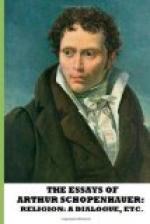Still, I wish some one would attempt a tragical history of literature, giving the way in which the writers and artists, who form the proudest possession of the various nations which have given them birth, have been treated by them during their lives. Such a history would exhibit the ceaseless warfare, which what was good and genuine in all times and countries has had to wage with what was bad and perverse. It would tell of the martyrdom of almost all those who truly enlightened humanity, of almost all the great masters of every kind of art: it would show us how, with few exceptions, they were tormented to death, without recognition, without sympathy, without followers; how they lived in poverty and misery, whilst fame, honor, and riches, were the lot of the unworthy; how their fate was that of Esau, who while he was hunting and getting venison for his father, was robbed of the blessing by Jacob, disguised in his brother’s clothes, how, in spite of all, they were kept up by the love of their work, until at last the bitter fight of the teacher of humanity is over, until the immortal laurel is held out to him, and the hour strikes when it can be said:
Der sehwere Panzer wird zum Fluegelkleide
Kurz ist der Schmerz, unendlich ist die
Freude.
PHYSIOGNOMY.
That the outer man is a picture of the inner, and the face an expression and revelation of the whole character, is a presumption likely enough in itself, and therefore a safe one to go by; evidenced as it is by the fact that people are always anxious to see anyone who has made himself famous by good or evil, or as the author of some extraordinary work; or if they cannot get a sight of him, to hear at any rate from others what he looks like. So people go to places where they may expect to see the person who interests them; the press, especially in England, endeavors to give a minute and striking description of his appearance; painters and engravers lose no time in putting him visibly before us; and finally photography, on that very account of such high value,




